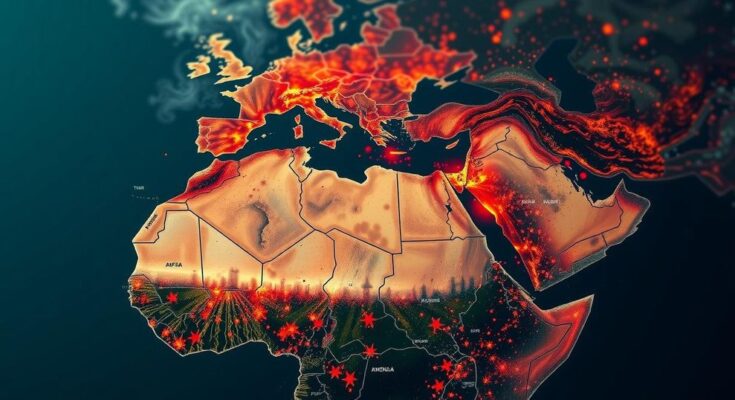The Horn of Africa faces renewed tensions, particularly in Ethiopia, where conflicts stemming from the civil war in Tigray continue to destabilize the region. Prime Minister Abiy Ahmed’s quest for Red Sea access complicates relations with Somalia and Egypt, while external powers become increasingly involved. The potential for conflict escalation is high, requiring urgent international diplomatic efforts to prevent humanitarian disasters and security threats.
In recent years, the Horn of Africa has experienced a series of destabilizing conflicts, particularly highlighted by the situation in Ethiopia. As the United States approaches another presidential election, it is imperative to reflect on the resurgence of tensions in this vital region. The escalation of conflict in Ethiopia commenced in November 2020, coinciding with the U.S. elections, leading to a protracted war that severely threatened Ethiopia’s stability. Although a cessation of hostilities agreement was reached in 2022, numerous issues remain unresolved, most notably concerning the return of displaced persons. Ethiopian Prime Minister Abiy Ahmed faces mounting challenges, as the coalition he formed to address the Tigray conflict has disintegrated. Currently, civil unrest persists in the Amhara and Oromia regions, exacerbating the fragile situation. As the U.S. fixates on the forthcoming presidential race, it is crucial not to overlook the potential for renewed conflict in the Horn of Africa. Abiy’s ambitions to secure access to the Red Sea, combined with his inclination to take significant risks, have led to heightened tensions with neighboring countries. Notably, Abiy’s decisions to negotiate with Somaliland for sea access have further strained the already complex relationship with Somalia. Concurrently, Egypt remains acutely concerned about the Grand Ethiopian Renaissance Dam and is actively seeking to forge alliances to pressure Ethiopia, including providing military support to Somalia. Eritrea has also engaged with both Egypt and Somalia, aiming to maintain a strategic advantage over its neighbors. The involvement of non-African powers further complicates the situation in the Horn of Africa. The recent strengthening of ties between Turkey and Somalia, alongside the United Arab Emirates’ continued support for Abiy, illustrates the intricate web of international interests at play. The risk of miscalculations leading to broader conflict is alarmingly high, with dire consequences that would first impact African civilians before reverberating throughout the global economy, particularly as critical maritime routes face increasing insecurity. In the backdrop of these escalating tensions, the humanitarian crisis in Sudan and the volatility in Somalia continue to deteriorate, with limited international attention or resources accorded to them. Al-Shabaab’s threat in Somalia grows, presenting additional challenges in regional stability. It is paramount that the United States actively engages in diplomatic efforts to mitigate tensions, avert proxy conflicts, and address the humanitarian needs exacerbated by these crises.
The Horn of Africa is a region defined by a complex tapestry of ethnic groups, historical grievances, and geopolitical interests. Ethiopia has been at the epicenter of conflict, particularly following the outbreak of civil war in Tigray, which drew international attention and prompted significant humanitarian crises. The dynamics within Ethiopia, particularly under the leadership of Prime Minister Abiy Ahmed, have significant implications not only for the country’s stability but also for the broader region, including relations with neighboring states like Somalia and Egypt, who are deeply intertwined in these disputes. Additionally, outside powers have increasingly engaged in this historically contested terrain, seeking to assert their influence and secure their interests amidst rising tensions.
In conclusion, the escalating tensions in the Horn of Africa, particularly in Ethiopia, warrant urgent attention from the international community. As various factions vie for power and regional states maneuver for strategic advantages, the potential for widespread conflict looms large. The United States, given its influence and responsibilities on the global stage, must prioritize mediation and conflict resolution efforts to prevent further escalation that could have catastrophic humanitarian implications and destabilize global economic interests.
Original Source: www.cfr.org




